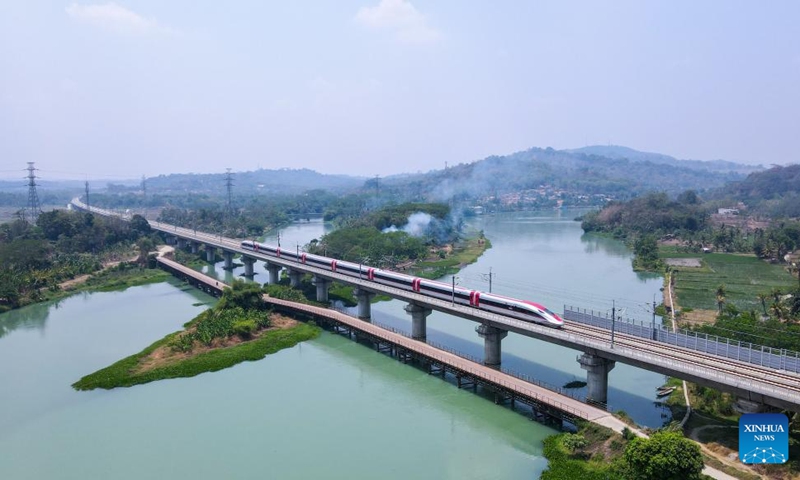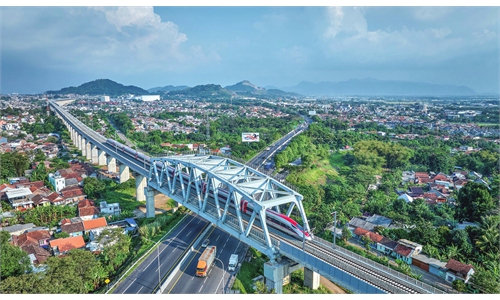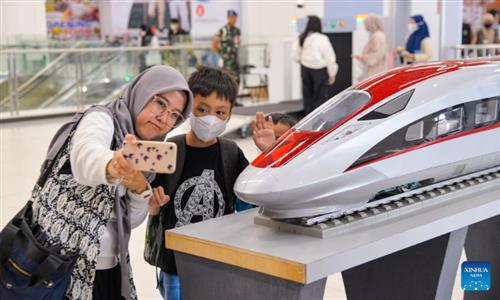Jakarta-Bandung HSR carries 1.45m passengers in 100 days; China’s quality intl public goods propel regional growth
China’s quality intl public goods propel regional economic integration

This aerial photo taken on Sept. 30, 2023 shows a high-speed electric multiple unit (EMU) train of the Jakarta-Bandung High-Speed Railway running in Purwakarta, Indonesia. Indonesian President Joko Widodo declared the official operation of the Jakarta-Bandung High-Speed Railway (HSR) at Halim Station in Jakarta Monday morning. Photo: Xinhua
The Jakarta-Bandung High-speed Railway (HSR) in Indonesia marked its 100th day of operation on Wednesday, having handled a total of 1.45 million passenger trips. The daily seat occupancy rate reached a peak of 99.6 percent, maintaining a consistently high level of passenger flows.
The number of daily trips has increased from 14 at first to 40 on weekdays and 48 on weekends. During the first 100 days, the service ran 3,487 trips, and the highest number of passengers in a single day reached 21,537, the Xinhua News Agency reported, citing an official from China Railway International.
Septian Hario Seto, a deputy minister of Indonesia's Coordinating Ministry for Maritime and Investment Affairs, said in an interview with Xinhua that the railway has revolutionized travel between Jakarta and Bandung. He expressed eagerness to extend cooperation with China and expand the high-speed railway from Jakarta to Surabaya via Yogyakarta.
The Jakarta-Bandung HSR is a flagship project jointly constructed by China and Indonesia under the Belt and Road Initiative (BRI). It marked the first time that Chinese HSR technology was implemented in an all-round way abroad, with all elements and the whole industry chain.
Since it began operation in October 2023, the Jakarta-Bandung HSR has facilitated travel by local people and more importantly stimulated the development of the economy along its route. It has generated jobs and boosted the vitality of the local economy, experts said.
Economic development zones have been built around major stations along the line, which are new economic growth points and are expected to promote broader local economic development, Zhou Shixin, a research fellow at the Shanghai Institutes for International Studies, told the Global Times on Thursday.
In the process of jointly promoting the BRI, China and Indonesia have collaborated to create a series of high-quality infrastructure projects, including power stations, roads and bridges, dams and telecommunications facilities.
Taking the Jakarta-Bandung HSR project as an example, more than 75 percent of the services and procurement for the project are sourced locally in Indonesia. This has significantly bolstered the local supply chain and employment, particularly in the training of thousands of qualified technical personnel, according to media reports.
Not only with Indonesia but also with many other Southeast Asian countries, China has carried out similar flagship collaborative projects. Examples include the China-Laos Railway and the high-speed highway in Cambodia, Zhou said.
These projects highlight the confidence that Southeast Asian countries place in China's technical expertise and financing capabilities in infrastructure development. China has emerged as their optimal choice for collaboration in these projects, Zhou said.
China will persist in driving the high-quality development of the BRI and collaborating on more infrastructure projects, particularly those involving cross-regional transportation, Song Wei, a professor at the School of International Relations at Beijing Foreign Studies University, told the Global Times on Thursday.
Such large-scale projects are crucial for unlocking development bottlenecks, which are particularly prominent in developing countries, Song said.
From the perspective of financing, developed countries have shown limited interest or capacity in terms of investing in such projects. China is poised to be one of the few providers of cross-regional infrastructure financing, contributing more such public goods in the form of infrastructure to the world, Song noted.
"It will play a pivotal role in propelling the overall growth of developing countries and fostering regional economic and trade integration," she said.
As the world is entering a new period of turbulence and change, more people realize the epochal value and global significance of the BRI. The initiative promotes connectivity instead of decoupling or division, and pursues win-win cooperation instead of confrontation, Foreign Ministry spokesperson Wang Wenbin told a regular press conference in Beijing on Thursday.
China is willing to deepen international cooperation under the BRI with countries around the world, building more "Happy Roads" that benefit the development of all countries, and making greater contributions to achieving a world of peaceful development, mutually beneficial cooperation and common prosperity, Wang said.



